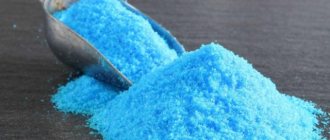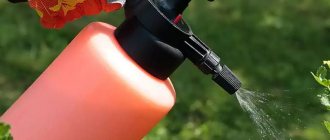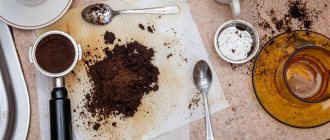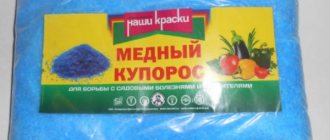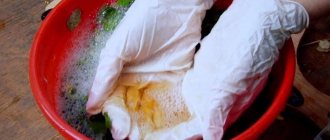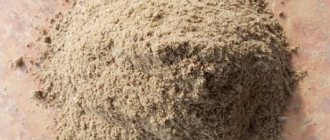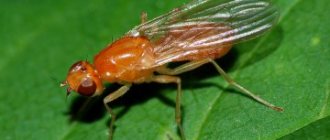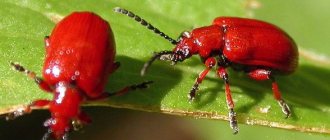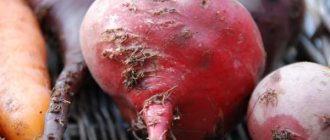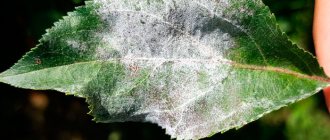Purpose of Karbofos
Karbofos is a popular contact-intestinal organophosphorus insectoacaricide with a wide spectrum of action, which is used in residential premises, on farms and in personal plots against:
- cockroaches,
- bedbugs,
- black garden and red ants,
- aphids,
- kidney and spider mites,
- sawflies,
- weevils,
- flies,
- mosquitoes,
- whiteflies,
- thrips,
- scale insects,
- mealybugs,
- leafhoppers,
- codling moth,
- fire,
- gall midge,
- slowpoke,
- grain,
- other dangerous pests.
The drug is also used for treating warehouses, destroying carriers of head lice and malaria, endo- and exoparasites.
Effect of the drug Karbofos
The active substance of Karbofos is malathion, which is tasteless and odorless, and to eliminate cases of accidental poisoning, a flavoring agent is added to the drug. Once in the digestive system of the parasite or on its body, malathion interacts with the acidic environment and is converted into a very toxic substance that literally kills the pest within a few hours.
- Reviews about the use of Kleschevit
The drug destroys adults and larvae, but is safe for oviposition. The protective effect of Karbofos does not last very long: up to ten days in open ground and 5-7 days in protected ground. But Karbofos quickly disintegrates in soil, water and air, without poisoning them. The period for the last treatment of plants with the drug is a month and a half before harvesting, however, if you thoroughly wash the cucumbers and tomatoes after harvesting, you can treat them with Karbofos literally 2-3 days before harvesting.
Analogues of Karbofos are the drugs Fufanon, Aliot, Atlant, Pedilin, Avidust and Decis.
Errors
- With regular use of karbofos, the so-called addiction of pests to the toxic substance occurs . The effectiveness of the product decreases with each subsequent treatment. Alternating insecticides with different spectrums of action helps to avoid resistance. The main mistake of inexperienced gardeners is replacing one drug with another without taking into account the composition. Meanwhile, many protective agents are produced based on the same active substance, that is, they are essentially analogues. Their alternate use leads to the emergence of populations of parasites resistant to a particular pesticide. When selecting plant protection products, it should be borne in mind that malathion, which is part of Karbofos, is an integral part of such drugs as Alatar, Antiklesch, Kemifos, Iskra M → application, Fufanon, Prophylactic" and many other popular remedies.
- Surface spraying of the drug often does not give the expected effect. The fact is that karbofos is a contact insectoacaricide. This means that toxicity occurs only when the substance comes into contact with the insect’s body. Individuals caught in the treatment area are destroyed almost instantly. But the pests that have escaped the influence of the poison do not die and continue to multiply and parasitize the plant. Therefore, any crop should be sprayed carefully, trying to treat not only the top, but also the back side of the leaves or tops. It is better to use a fine spray that ensures access of the working solution to all parts of the plant.
Instructions for use of Karbofos
The drug is available in the form of a water-soluble powder in bags of 30, 60 g, 1 or 5 kg. You can find Karbofos in the form of a suspension in ampoules of 5 or 10 ml and in bottles of 250, 500 and 1000 ml. Ready-made working solution of Karbofos is also sold in 5 liter canisters.
If you decide to prepare the working composition yourself, dissolve the dose of the drug indicated in the instructions first in a small amount of water, and then, adding water and stirring the composition, bring it to the required volume.
The table shows the amount of water required to prepare a working solution from a package of Karbofos weighing 60 g.
| Culture | Pest | Water for solution | Solution consumption | Last processing |
| Grape | Phylloxera, spider mite, mealybug | 8 l | 15 l per 100 m2 | 45 days before harvest |
| Gooseberry | Sawflies, moths, moths, leaf rollers | 8 l | 1 l per 1 bush | 30 days before harvest |
| Blackberries and raspberries | Aphids, mites, weevils, bud moths, raspberry-strawberry beetles | 8 l | 10 l for 10 bushes | 30 days before harvest |
| Currant | Sawfly, bud moth, gall midge, leaf roller, scale insect, aphid | 8 l | 1.5 l per 1 bush | 30 days before harvest |
| Pear, apple, quince | Leaf roller, codling moth, weevil, cherry fly, scale insect, sawfly, mites | 6-8 l | 2-10 l per 1 tree | 30 days before harvest |
| Peach, apricot | Aphids, leaf rollers, codling moths | 10 l | 2-10 l per 1 tree | 30 days before harvest |
| Cherry, sweet cherry, plum | Leaf roller, weevil, cherry fly, scale insect, sawfly, mites | 8 l | 2-10 l per 1 tree | 30 days before harvest |
| Melon watermelon | Melon ladybird, melon fly, aphids, mites | 8 l | 10 l per 100 m2 | 20 days before harvest |
| Beet | Aphids, miners, moths, bedbugs | 10 l | 10 l per 100 m2 | 30 days before harvest |
| Cabbage | Aphids, bedbugs, whites, flies, moths | 10 l | 10 l per 100 m2 | 30 days before harvest |
| Tomatoes | Spider mites, whiteflies, aphids | 10 l | 10 l per 100 m2 | 30 days before harvest |
| Peppers, cucumbers | Thrips, spider mite, sprout fly | 10 l | 10 l per 100 m2 | 30 days before harvest |
| Sea buckthorn | Aphids, gall mites | 3 l | 20 l per 100 m2 | * |
| Tobacco | Aphids, bedbugs | 6 l | 10 l per 100 m2 | 60 days before harvest |
| Roses and other shrubs | Aphids, spider mites, rose sawfly | 8 l | 20 l per 100 m2 | ** |
| Flower crops | Thrips, mites, aphids | 8 l | 10 l per 100 m2 | ** |
| Citrus | Whitefly, mealybug, mites | 6-7 l | 5 l per 1 tree | 50 days before harvest |
Plants should be sprayed so as to evenly moisten the stems and leaves on all sides with the mixture. The treatment is carried out with a freshly prepared solution at an air temperature no higher than 15 ºC in calm and dry weather. The speed of action of the drug is 3-4 hours. Plants are treated with Karbofos no more than 2 times, and repeated spraying is done 10 days after the first. Then the drug must be changed, otherwise the pests will develop resistance.
- How to dilute Lepidocide for treating plants
Safety precautions when using the drug in a garden plot
1. Before working with the drug near beds with green crops, be sure to cover them with plastic wrap.
2. Do not use insecticide during flowering of fruit and ornamental plants, so as not to kill the bees. Hives located nearby should be sealed for 5 days.
3. Carefully read the names on the packaging before using: some manage to confuse the insecticide “Karbofos” with the nitrogen-phosphorus fertilizer “Ammophos”.
4. To work with the drug, choose suitable weather: calm or weak wind, low temperature (up to 15-18 degrees).
Karbofos is an affordable and effective drug for exterminating insects dangerous to humans and plants. An insecticide with simple instructions has shown itself to be excellent in various areas of production and everyday life.
Insecticides are special preparations used to combat various types of dangerous insects. Among them, a special place is occupied by Karbofos, which helps get rid of garden pests, cockroaches, flies, bedbugs and ants.
Precautionary measures
Treatment of plants and premises with Karbofos is carried out using personal protective equipment: overalls, glasses, gloves and a respirator. Drinking, eating and smoking are prohibited during the procedure. Upon completion of work, you need to change clothes, wash your hands and face with soap, and rinse your mouth.
Do not allow the drug to overheat: keep the working solution away from fire and direct sun.
After treating a living space with Karbofos, you can return to it only after 5 hours.
Insecticide cost
Regardless of the form and volume of release, the insecticide has the same, equivalent effect. The price of Karbofos depends on the volume:
- concentrated solution in large-volume canisters starts at 4,200 rubles.
- the cost of a package of powder with a volume of 60 g is 65–70 rubles, 30 g — 39–44 rubles.
- concentrate in a 5 ml ampoule - for 2 ampoules you will have to pay 24-26 rubles, for 1 ampoule of 10 ml - 38 rubles.
The cost of the drug may vary depending on the outlet.
Signs of poisoning and first aid
The recommendations below are intended only for providing FIRST aid, after which you should immediately consult a doctor and follow his instructions! DO NOT SELF-medicate!
Signs of Karbofos poisoning are a depressed state and inhibition of reactions, which after an hour are replaced by motor agitation, excessive salivation and even vomiting. In severe cases, tremors and convulsions may occur, accompanied by shallow breathing.
- If particles of the drug get on the mucous membrane of the eyes, they should be washed with plenty of clean water for 15-20 minutes.
- If exposed skin is affected, you also need to rinse them well.
- If Karbofos gets inside the body, you must immediately drink 4-5 tablets of activated carbon with several glasses of water, induce vomiting and seek emergency help.
- Even if you think your poisoning with Karbofos is mild, consult a doctor or consult a poison control center.
How to use it correctly
The effectiveness of the drug directly depends on proper use; compliance with safety measures is mandatory.
The processing procedure itself consists of several stages, each of which is very important:
- Study the instructions;
- Purchase protective equipment;
- Prepare the room;
- Preparation of the solution;
- Treatment;
- Final steps.
When working with the product, you must use protective equipment, wear gloves, a respirator and safety glasses. Only the person performing the procedure should be in the room; this applies to people and animals.
Studying the instructions
Depending on the form in which you purchased the drug, you must study the rules of use and strictly follow the recommendations. Prepare the solution according to the specified proportions. Remember that you cannot change the proportions yourself; a weaker solution will not bring results, and a highly concentrated one can be dangerous.
Protective means
You need to prepare clothes that completely cover your body, ideally work in protective overalls, and be sure to wear rubber gloves on your hands.
To protect yourself from toxic fumes, be sure to wear a respirator. Since the insecticide is applied using a sprayer and small drops fly in different directions, it is necessary to protect your eyes with glasses.
Preparation of the solution
It doesn’t matter which form of the drug you choose: Karbofos powder for bedbugs, as well as liquid emulsion, is intended for dilution with water and preparation of a solution. The table offers average data.
Table - Dilution proportions of "Karbofos"
Form of preparation Volume of water, ml Volume of poison
| Emulsion | 1000 | 5-10 ml |
| Powder | 4-5 g |
The exact amount of poison required to dilute the concentrate is indicated on the packaging. In case of severe bedbug infestation, it is recommended to prepare a more concentrated solution.
Spraying
Reviews of Karbofos against bedbugs confirm that a liter of solution is enough to treat a room in an apartment. This volume is designed for 20 m2. The rules for treating the premises do not depend on what form of poison you choose - dry or liquid. They are identical for any preferred option.
- Convenient spraying. Manufacturers recommend pouring the solution into a spray bottle, or better yet, into a garden sprayer. This way you will ensure comfort when working with the drug and will be able to distribute it evenly throughout the apartment.
- Treatment of hard-to-reach places. Liquid “Karbofos” against bedbugs should penetrate even where your hands cannot reach. On the one hand, a spray bottle will help with this. On the other hand, competent preparation of the premises for disinfestation. Furniture must be moved away from the walls: most often, bedbug nests are located in places hidden from human eyes. The preparation must be applied to the back of cabinet and upholstered furniture, niches under window sills and to their lower surface. If there are places where the wallpaper has moved away from the wall, you also need to “walk” over them. Not to mention the space behind the baseboards and under the carpets, where bloodsuckers also often hide.
- Application to upholstered furniture. For cabinet furniture, surface treatment is sufficient. And on sofas, armchairs, ottomans and mattresses, the solution must be applied generously - in larger quantities.
Reapplication
“Karbofos” helps against bedbugs, but for a 100% effect, the solution must be treated twice. Repeated spraying is usually planned 72 hours after the initial spray. The room in which disinfestation is carried out must be thoroughly ventilated every day. For this purpose, the windows in an apartment or house are opened for about two to three hours, and then closed again. If you neglect ventilation and do not provide the room with proper circulation of fresh air, the acrid smell of poison will remain with you for a long time.
Household members will be able to return home only five days after repeated spraying of the insecticide. Before returning, the monastery must be thoroughly vacuumed. Places with which family members constantly come into contact should be treated with soapy water to wash off any remaining poison.
Currently, malathion is increasingly being replaced by synthetic insecticides that are safer for warm-blooded creatures. These include:
- cypermethrin;
- permethrin;
- thiamethoxam;
- diazinon.
If you decide to give preference to malathion, remember: you need to dilute Karbofos for bedbugs in accordance with the instructions printed on the package. A drug can be considered safe for humans only if all protective measures are followed. If the poison does enter the body, you will understand this by the symptoms. Blood pressure will increase, nausea will begin, and possibly vomiting. First aid in such a situation is to provide the patient with a flow of fresh air and take sorbents. Consultation and examination by a doctor after poisoning with Karbofos is mandatory
Reviews
Marina: the drug is inexpensive, the smell is not very unpleasant. I used it against bedbugs that were brought into our house by new neighbors. The battle was long and eventually crowned with success. True, we had to get rid of the carpets.
Victor: Karbofos is an effective drug. I’ve been using it for the second season: in the spring I poison ants, aphids, ticks and other pests that appear on the site. However, we must not forget that Karbofos destroys not only harmful, but also beneficial insects, so do not use it during flowering.
Oleg: I am a conservative person and trust only proven drugs, so Karbofos for me is the first remedy for pests. Lethal force, as they say. However, more than two treatments with Karbofos cannot be done during the season, so I also resort to the help of other insecticides.
Dmitry: Karbofos acts quickly and radically. Sometimes you don’t even have to clean up the plantings behind it. Moreover, I am responsible for preventing pests and diseases. But Karbofos is a real “ambulance” for plants.
Anna Kovaleva: last year we had to hastily treat plants against ticks. I used Karbofos, but it didn’t work because it started to rain. When dry weather arrived, I didn’t dare spray Karbofos again and used a different insecticide. This year I sprayed vegetables with Karbofos with great doubts. The result was excellent the first time. I shouldn't have worried.
More information about the drug: https://ru.wikipedia.org/wiki/Malathion
Bottom line
Karbofos is a widely known and frequently used insecticide for treating garden plants and residential premises against insect pests. It equally effectively eliminates blood-sucking and leaf-eating insects. If you do not abuse the use of this pesticide, then insects do not develop resistance to it: they do not get used to it.
The chemical formula is based on malathion, a potent poison of organic origin. Malathion is the main substance not only for the creation of karbofos, but also other insecticides and pesticides. You can choose a less toxic drug with a similar effect and no pungent odor.
What mineral fertilizer did you use?
You can select multiple answers or enter your own.
- Superphosphate 13%, 1163 votes
1163 votes 13%1163 votes - 13% of all votes
- Urea 9%, 798 votes
798 votes 9%
798 votes - 9% of all votes
- Nitroammophoska 8%, 690 votes
690 votes 8%
690 votes - 8% of all votes
- phytosporin*7%, 605 votes
605 votes 7%
605 votes - 7% of all votes
- Dolomite flour 6%, 538 votes
538 votes 6%
538 votes - 6% of all votes
- Potassium monophosphate 5%, 451 votes
451 votes 5%
451 votes - 5% of all votes
- Azofoska*5%, 433 votes
433 votes 5%
433 votes - 5% of all votes
- Calcium nitrate*5%, 407 votes
407 votes 5%
407 votes - 5% of all votes
- complex mineral and vitamin*4%, 374 votes
374 votes 4%
374 votes - 4% of all votes
- potassium magnesia, urea, potassium sulfate, ash*4%, 315 votes
315 votes 4%
315 votes - 4% of all votes
- saltpeter*3%, 297 votes
297 votes 3%
297 votes - 3% of all votes
- Ammophoska 3%, 281 votes
281 votes 3%
281 votes - 3% of all votes
- Diammofoska 3%, 280 votes
280 votes 3%
280 votes - 3% of all votes
- View answers*3%, 261 votes
261 votes 3%
261 votes - 3% of all votes
- manure*3%, 237 votes
237 votes 3%
237 votes - 3% of all votes
- Ammonium sulfate 3%, 235 votes
235 votes 3%
235 votes - 3% of all votes
- potassium nitrate*2%, 209 votes
209 votes 2%
209 votes - 2% of all votes
- ammonium nitrate*2%, 179 votes
179 votes 2%
179 votes - 2% of all votes
- Potassium sulfate, magnesium sulfate*2%, 157 votes
157 votes 2%
157 votes - 2% of all votes
- only manure*1%, 110 votes
110 votes 1%
110 votes - 1% of all votes
- Potassium chloride 1%, 110 votes
110 votes 1%
110 votes - 1% of all votes
- Borofoska*1%, 91 votes
91 votes 1%
91 votes - 1% of all votes
- potassium humate*1%, 90 votes
90 votes 1%
90 votes - 1% of all votes
- nitrophoska*1%, 68 votes
68 votes 1%
68 votes - 1% of all votes
- Nettle infusion*1%, 56 votes
56 votes 1%
56 votes - 1% of all votes
- Only ash*1%, 52 votes
52 votes 1%
52 votes - 1% of all votes
- Monoammonium phosphate, monopotassium phosphate, diammonium phosphate*1%, 49 votes
49 votes 1%
49 votes - 1% of all votes
- Anhydrous ammonia 0%, 40 votes
40 votes
40 votes - 0% of all votes
- Osmocote*0%, 32 votes
32 votes
32 votes - 0% of all votes
- gumi*0%, 26 votes
26 votes
26 votes - 0% of all votes
- ammophos*0%, 16 votes
16 votes
16 votes - 0% of all votes
- Quicklime*0%, 7 votes
7 votes
7 votes - 0% of all votes
- sulfoamophos*0%, 6 votes
6 votes
6 votes - 0% of all votes
- Nutrivant plus*0%, 3 votes
3 votes
3 votes - 0% of all votes
Total votes: 8666
Voted: 2078
01.04.2019 — 30.11.2022
* - added by visitor
×
You or from your IP have already voted.
